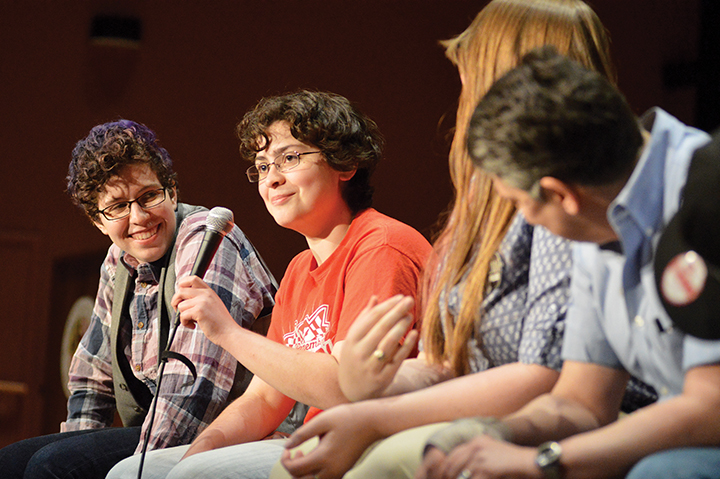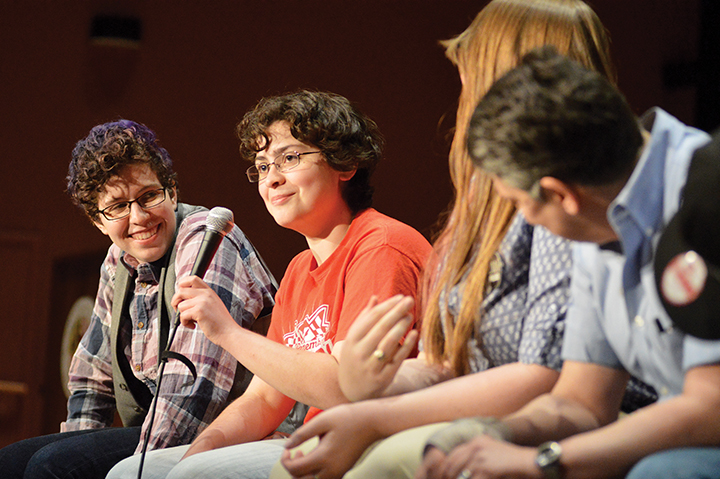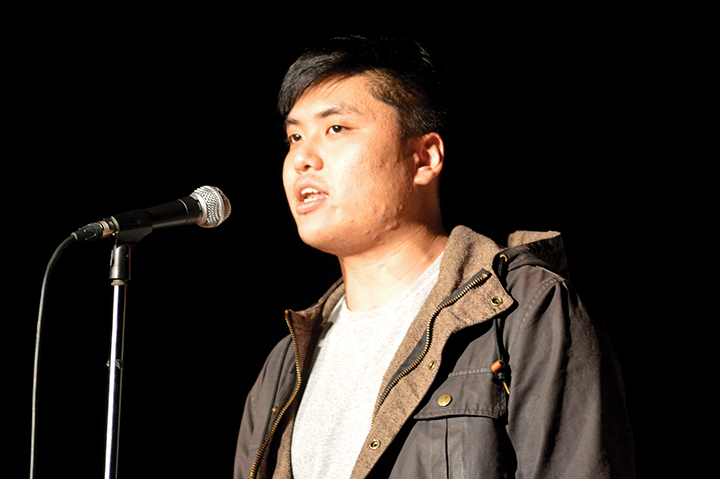Audience members waited silently in the dark as footsteps echoed from the Hoff Theater stage in Stamp Student Union. Charley Goldman took position behind the microphone and lectern and spotlights shone.
“I realized I wasn’t straight in the 10th grade, but this story isn’t about that,” said Goldman, a junior psychology major. “This is the story of a haircut.”
Over the past few months, Goldman has adopted a new hairstyle, a new name, an androgynous wardrobe of button-downs and vests and a gender-neutral third-person pronoun. Goldman, now called “they,” not “she,” by their suitemates and others they’ve come out to as gender queer, has finally found an identity that fits them.
Goldman was one of nine people from the LGBTQA community who took the Hoff stage Friday to recite a story or poem in front of about 80 people at The Queer Monologues 2014, organized by the Office of Multicultural Involvement & Community Advocacy.
“I can’t really put into words what happened when I got my hair cut,” said Goldman, formerly Rebecca, whose curly hair was cut short and dyed green in the back. “Short hair for me meant freedom -— freedom to discover who I truly was. … After 10 years of trying so hard to be something I’m not, it’s nice to finally be able to take a step back to finally just let myself be.”
Students shared breakthroughs and despair, stories of summer camp trysts and children driven to suicide, memories of ostracism, slurs, beatings and families divided.
“I’ll never be able to love a woman, but understand that my definition of love isn’t blind disobedience,” Kevin Chen, a senior accounting and finance major, read from a poem he wrote to his father. “Laws, traditions, conditions were meant to be broken, so let’s imagine them done with.”
The students also shared stories of small victories.
“I got sir-ma’am’ed at the CVS recently and it was fantastic,” Goldman said.
Jo Arnone, 56, presented last. She was prescribed psychotherapy as a teenager and survived police beatings and bar raids as a lesbian in 1970s Queens, N.Y.
When many feminists “launched a campaign to wipe the face of the feminist movement clean of all traces of women who expressed difference,” Arnone said, she co-founded the Lesbian Sex Mafia, a women’s BDSM support and education group. She marched in brown leather from head to toe with 19 LSM members in the 1982 New York City gay pride march, braving summer heat and thrown bottles. She has been an announcer for the pride march since 1984, she said.
“When the Trevor Project [a suicide prevention and crisis intervention service for LGBTQ young people] says it gets better, trust me, it does,” Arnone said. “The more effort and the more energy you put into getting there, the more you grow, the more you move and you shake, the more you let it roll off your back and the more that you keep remembering it gets better, the faster it does.”
After recounting their experiences, the speakers sat on the edge of the stage and answered questions from audience members. Brandon Edwards, a sophomore enrolled in letters and sciences who will be a resident assistant next year, asked what he could do to help as a community leader.
A few speakers recommended Edwards put a rainbow flag sticker on his door as a signal to students looking for help.
“By the way,” Arnone said, “if you put a rainbow flag out in front of your room or whatever, don’t forget, there are people that are going to think you’re gay.”
The audience laughed when Edwards jokingly replied, “It’s healthy to make assumptions.”
Edwards said he appreciated the “bluntness and honesty” with which the speakers shared their experiences.
“It wasn’t something that I understood,” he said. “I knew nothing. So I feel like if you know nothing, you can’t do anything.
“It helps me understand what somebody else is going through, so therefore I can react as a leader better — not as a leader, also as a friend.”
Charley Goldman (left) and Cal Lynn (center) answer questions after performing in the Queer Monologues in the Hoff Theater in Stamp on April 18.
Kevin Chen performs at the Queer Monologues in the Hoff Theater in Stamp on April 18.





